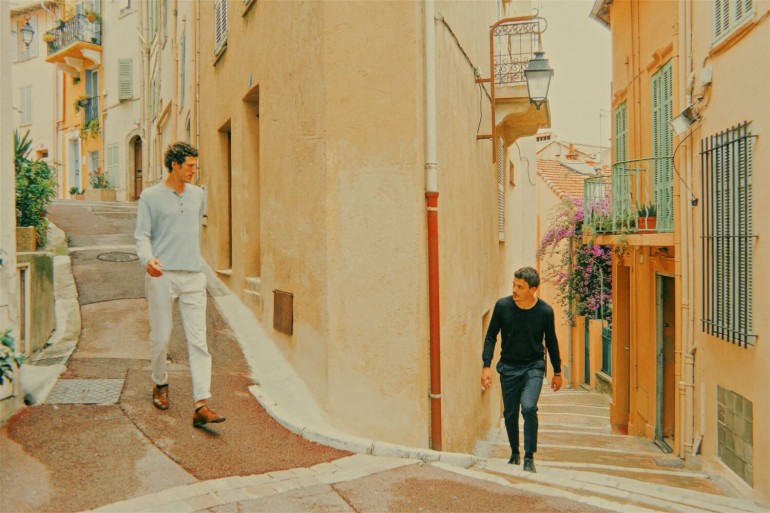
Music has the power to transport us to an imagined place. In the case of Where is Piemont, the area that we find ourselves might be best described as ‘unimagined.’ That is, somewhere that exists within the world of imagination that we have not been able to realize. It is a kind of collage of places, each recognizable on its own, but when drawn together it is an entirely unfamiliar world.There is a liquidity of time and space in MALKY’s new album and they draw from a wealth of cultural and aesthetic resources to navigate the places that are featured.
‘Thanks to the fact that we have the ability to mind travel, we often escaped into a place where culture was more all around and was continuously connected with a great past….There have been romantic writers in the 19th century writing about their adventures in exotic countries they´d only seen from paintings or photos. We are quite the same – it´s a very old-fashioned way of work but it works for us – and it has to work, because no mind location – no music.’
The artists carefully guide us through their unimagined spaces as they attempt to erect an altogether unique environment. There is the obvious reference to Italy, but they composed the album primarily in Germany. Additionally, the cover suggest something of a tropical beach vibe and there are definitely elements in the music that reflect this aesthetic.
[Like] so many artists before we dreamed about Italy. It´s an imaginative, made-up version of Italy, consisting of Fellini movie scenes, pictures of houses belonging to some Tuscan dukes, and Louis Prima singing ‘Angelina’.
The prevailing style draws on elements from old Americana art style of the 60s and 70s, but there is a more cogent relationship with these sources than on their other LP, Soon. With regards to the method of arriving at the sounds for this new release they state: ‘[You] start to work your way back to harmony – the result was a very intense, more colorful, more expressive album. Our taste developed too – drifting more far away from the mainstreams into the golden era of musical soundtracks and crooning(masculine) pop singers.’
The notion of connection with a past is essential in MALKY’s aesthetic. Like so many artists, they are cultural archeologists, sifting through the folklore and style of a past generation. They distinguish themselves by not being burdened with the task of excavating artifacts. There is an effortlessness to their relationship with the past. It feels at first almost like they don’t care – that they simply effuse this cool 70s vibe. However, when one listens closely, the archive of their influences is shown to be expertly curated with a sensitive touch.
‘I´m sure that folklore is the mother vein of many peoples musical stream. Unless I could not find an explanation why I get tears in my eyes hearing Bulgarian folklore. There´s a nearness of home in it in a general sense of the word. It has nothing to do with me analyzing it while listening and then feeling touched. No, it´s an immediate connection and it´s highly emotional musically.’
One of the most distinctive features of the album is the varied instrumentation found on each of the tracks. The song Cup of Hope features complex arrangements for large ensemble and is a kind of homage to the orchestral arrangements in 70s soul music. However, tracks like Lampedusa and Theodore feature minimal orchestral resources but penetrating in their simplicity.

Photo by Max Parovsky
‘We talk about the message of the song. We look for musical ways to translate it’
Despite the attention to detail in the instrumental aspects of Where is Piemont, the album is essentially a story. Or perhaps it is better described as a collection of short stories – variations on a narrative theme. Either way we are in the hands of the narrator:
‘The singer is a messenger, a storyteller, and an actor. In some moments he’s singing on a mountain top as in ‘Only One’, in others, he’s becoming a character as in ‘The Fish’, ‘Play’ or ‘Lampedusa’, and in some songs, he’s as well himself as a character. In ‘Theodor’ for instance, he’s a Don Quixote-type of character telling a story from his very own personal life.’
There is often a kind of paradoxical pressure on artists to replicate something that was once seen new and unique, but the guys from MALKY are not worried about it and have a healthy relationship with the creative process: We haven´t been there yet, we haven´t started yet to work on the third record under such pressure. And second, we ourselves are in the mood of making a more relaxed third record. and we will make it with the same abilities and the same craftsmanship. So I guess it´ll still be MALKY then, just different. And pressure – well pressure is a joke when you have family and friends and a private life – first live right and then work right.’
LIVE
—
